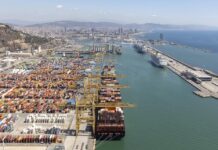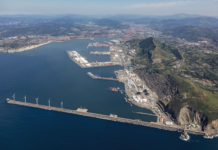Environmental regulation and costs from low-sulphur fuel represent a major challenge // New Marine Fuel Recovery (MFR) allows causal, transparent and easy-to-understand calculation of fuel oil costs
With a stricter International Maritime Organisation emissions regulation (IMO 2020) coming into force as of 1 January 2020, the new sulphur cap for compliant fuel oil will be lowered from 3.5% to 0.5%. This new regulation will significantly improve the ecological footprint of the shipping industry, and the majority of all vessels are expected to be operated with low-sulphur fuel oil by then. Using low-sulphur fuel oil will be the key solution for the shipping industry and Hapag-Lloyd to remain compliant. Furthermore, it is the most environmentally friendly solution in the short term.
At the same time, the utilisation of the compliant low-sulphur fuel oil comes along with an increase in fuel costs, which experts estimate to initially amount up to 60 billion US dollars annually for the entire shipping industry. On the assumption that the spread between high-sulphur fuel oil (HSFO) and low-sulphur fuel oil (LSFO 0.5%) will be 250 US dollars per tonne by 2020, Hapag-Lloyd estimates its additional costs being around 1 billion US dollars in the first years. Therefore, a Marine Fuel Recovery mechanism was developed, which will be gradually implemented from 1 January 2019 and replace all existing fuel-related charges.
“We embrace the level playing field and environmental improvements resulting from a stricter regulation, but it is obvious that this is not for free and will create additional costs. This will be mainly reflected in the fuel bills for low-sulphur fuel oil, as there is no realistic alternative for the industry remaining compliant by 2020. With our MFR, we have developed a system for our customers that we think is fair, as it allows for a causal, transparent an easy-to-understand calculation of fuel costs,” said Rolf Habben Jansen, Chief Executive Officer of Hapag-Lloyd.
The MFR is based on a formula that combines consumption with market prices for fuel oils
It takes into account various parameters, such as the vessel consumption per day, fuel type & price (specific for HSFO, LSFO 0.5% and LSFO 0.1%), sea and port days, and carried TEU. These parameters derive from a typical representative service in the market on a specific trade. The MFR also takes price fluctuations better into account, as it comes along with an improved coverage of upward and downward developments of market price changes for fuel oil. Overall, it aims for transparent calculation of costs.
Furthermore, Hapag-Lloyd is thoroughly analysing other technological options for the reduction of emissions that might be able to cover a small share of a fleet. This is why trials with a LNG conversion of one ship as well as Exhaust Gas Cleaning Systems (EGCS) on two others will be conducted in the year 2019.
MFR samples for standard dry containers at different fuel prices for selected trades





